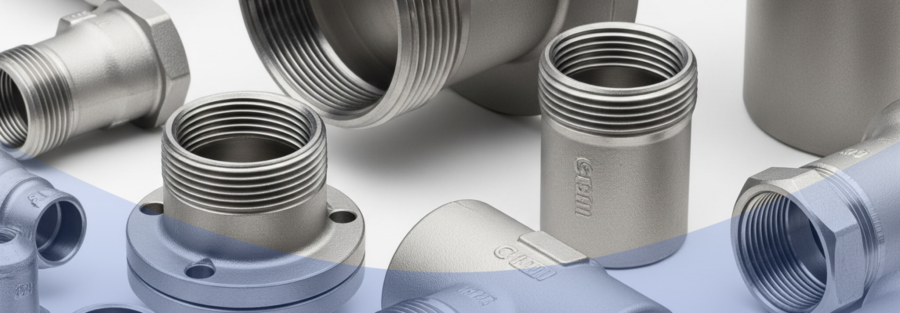Table of Contents
1. Introduction
In industries where strength, corrosion resistance, and lightweight performance are critical, titanium pipe fittings stand out as the ideal solution. Known for their durability and ability to withstand harsh environments, titanium fittings are widely used in aerospace, chemical processing, marine, and oil & gas industries.
In this guide, we’ll explore the properties, types, and benefits of titanium pipe fittings, along with their real-world applications and why they’re becoming a preferred choice over traditional materials.
2. What Are Titanium Pipe Fittings?
Titanium pipe fittings are components used to connect, change direction, or regulate flow in piping systems made of titanium. Unlike steel or copper, titanium offers a unique balance of high strength, lightweight structure, and exceptional corrosion resistance.
In simple words: Titanium fittings are the “connectors” in industrial pipelines, built to handle extreme environments where other metals fail.
3. Properties of Titanium Pipe Fittings
Titanium fittings are known for their exceptional physical and mechanical properties, including:
- High Strength-to-Weight Ratio → As strong as steel but nearly 45% lighter.
- Corrosion Resistance → Excellent resistance against seawater, chlorides, and chemicals.
- Temperature Resistance → Performs well from -250°C up to 600°C.
- Biocompatibility → Safe for medical and pharmaceutical use.
- Long Service Life → Reduces maintenance and replacement costs.
4. Types of Titanium Pipe Fittings
Titanium fittings come in different shapes and designs depending on their function:
- Elbows – change the direction of flow (commonly 45° or 90°).
- Tees – allow branching of pipelines.
- Reducers – connect pipes of different diameters.
- Cross Fittings – connect four different pipes.
- Couplings & Unions – join two pipes together.
- Caps & Plugs – seal the ends of pipes.
- Stub Ends & Flanges – used for pipe connections and disassembly.
5. Grades of Titanium Used in Pipe Fittings
Titanium pipe fittings are manufactured in various grades depending on the application:
- Grade 2 Titanium → Most common, excellent corrosion resistance, used in chemical and marine applications.
- Grade 5 Titanium (Ti-6Al-4V) → Stronger, used in aerospace, defense, and high-performance industries.
- Grade 7 Titanium → Contains palladium, highly resistant to reducing acids.
- Grade 12 Titanium → Used in heat exchangers, highly resistant to erosion and corrosion.
6. Benefits of Titanium Pipe Fittings
- Corrosion-Proof – performs exceptionally in seawater, chemicals, and chlorides.
- Lightweight yet Strong – reduces pipeline load without sacrificing durability.
- Heat Resistant – suitable for both cryogenic and high-temperature applications.
- Long-Term Cost Savings – minimal maintenance compared to steel or copper.
- Eco-Friendly – 100% recyclable, aligning with sustainability goals.
7. Applications in Different Industries
Titanium pipe fittings are widely used in industries where reliability under extreme conditions is essential:
- Aerospace – hydraulic systems, aircraft fuel lines.
- Chemical Processing – pipelines carrying corrosive chemicals.
- Marine & Offshore – seawater cooling, desalination plants.
- Oil & Gas – offshore drilling rigs, refinery equipment.
- Power Generation – heat exchangers, condensers.
- Medical & Pharma – biocompatible pipelines for sterile environments.
Titanium pipe fittings combine strength, light weight, and corrosion resistance, making them a premium choice for industries that demand long-term reliability under extreme conditions. From aerospace to marine and chemical processing, titanium fittings outperform traditional materials in both durability and efficiency.
At Riyaarth Overseas, we offer high-quality titanium pipe fittings in various grades, sizes, and standards to meet global industrial needs. Get in touch with us today to source the right titanium fittings for your projects.
8. FAQs
Titanium is lighter and more corrosion-resistant than stainless steel, making it ideal for seawater and chemical environments.
With proper use, titanium fittings can last 20–40 years or more, depending on the industry.
Yes, titanium fittings can handle high-pressure and high-temperature conditions effectively.
Grade 2 and Grade 7 titanium are most commonly used in marine and desalination applications due to their outstanding seawater resistance

